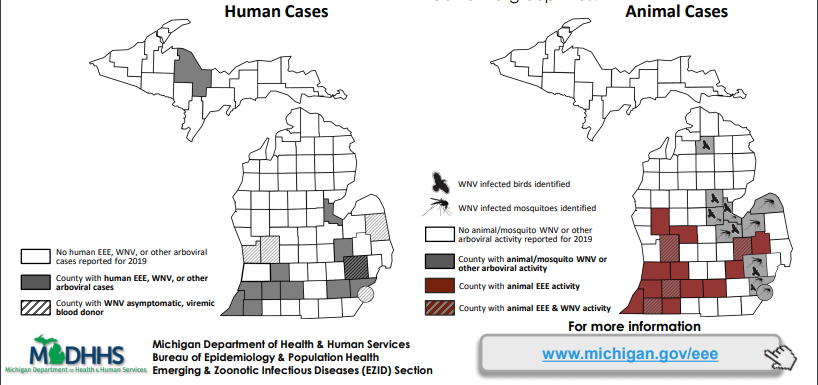Eastern Equine Encephalitis breaks out in Michigan, Calvin takes precautions
Michigan is currently experiencing an outbreak of the deadly mosquito-borne virus Eastern Equine Encephalitis, commonly abbreviated EEE. So far (as of 10/2/2019), there have been nine cases resulting in four deaths in West and Southwest Michigan. None of these human cases have occurred in Kent County, but on Sept. 26, the Kent County Health Department issued a statement announcing that a deer in the county had tested positive for the disease.
EEE is rare, yet deadly. The statement from the Health Department explained that while only about 4-5% of humans who are infected with EEE will become ill, of that group around 30% will die, and most of the survivors will suffer brain damage. As stated on the website of the Center for Disease Control (CDC), there is no cure or specific treatments.
Because of these risks, and as directed by public health officials, Calvin University is currently monitoring the situation and taking precautions.
“So far Residence Life is taking a careful approach to the news of EEE” John Witte wrote in an email to Chimes. Witte also explained the steps they took to keep students safe at the final dorm retreats.
“Attendees were notified of the situation and encouraged to wear insect repellent (which we provided) and wear long sleeves,” he said.
The athletic department has a bigger challenge: how to keep a large number of student athletes safe, while many are currently practicing outdoors. Dr. Nancy Meyer, senior associate athletic director, gave a statement to Chimes about the athletic department’s response to EEE.
“Once the case was identified in Kent County, we were in contact with Dr. Laura Champion, MD, of Calvin’s Health Center seeking her counsel,” Meyer wrote. “The MIAA also convened a conference call on Friday, Sept. 28 to determine what preventative measures each campus was taking. At that point no MIAA school had made plans to change game start times.”
Regarding safety during practice, Meyer wrote, “We are proceeding with caution and are asking that teams curtail their practices to end before dusk and that no early morning outdoor practices take place.” Currently, there are no scheduled changes to games.
“Our goal is to practice all due precaution, but at the same time realize that moving games to earlier start times involves more missed class time, changes in transportation, and rescheduling officials,” explained Meyer, although she noted that the athletic department is “continuously monitoring” EEE, and “will make further adjustments if the evidence warrants it.” The athletic department has also distributed the bug repellent DEET to all the Calvin sports teams.
The only failsafe way to avoid becoming ill with EEE is to avoid being bitten by a mosquito. To keep Calvin students from being bitten, the physical plant is currently working on killing mosquitoes on campus by spraying pesticides. Director of Facilities Russell Bray told Chimes about what his department has been doing.
“The track/soccer stadium and surrounding areas were sprayed with Bifenthrin on September 24 by a licensed applicator,” Bray wrote. “We expect to see 3-4 weeks of control from this application, depending on weather conditions. We will also be spraying the lower athletic fields and surrounding trees on October 4 in preparation of Saturday’s fireworks and homecoming activities.”
Bray also stated that heavy use of pesticides is not ideal, saying, “We are aware of the many concerns around insecticide usage and seek to use them sparingly when the risk of exposure to mosquitoes is highest and the potential side-effects of insecticide contact will be minimized.”
Last Friday, Sept. 27, Student News consisted solely of a bulletin by Dr. Laura Champion, director of health services, warning the Calvin community about the dangers of EEE. Champion wrote the following about the disease: “Signs of EEE include the sudden onset of fever, chills, body and joint aches which can progress to severe encephalitis, resulting in headache, disorientation, tremors, seizures and paralysis. Permanent brain damage, coma, and death may also occur in some cases. Students experiencing these symptoms should call Health Services (616-526-6187) or visit the local Urgent Care after hours.”



